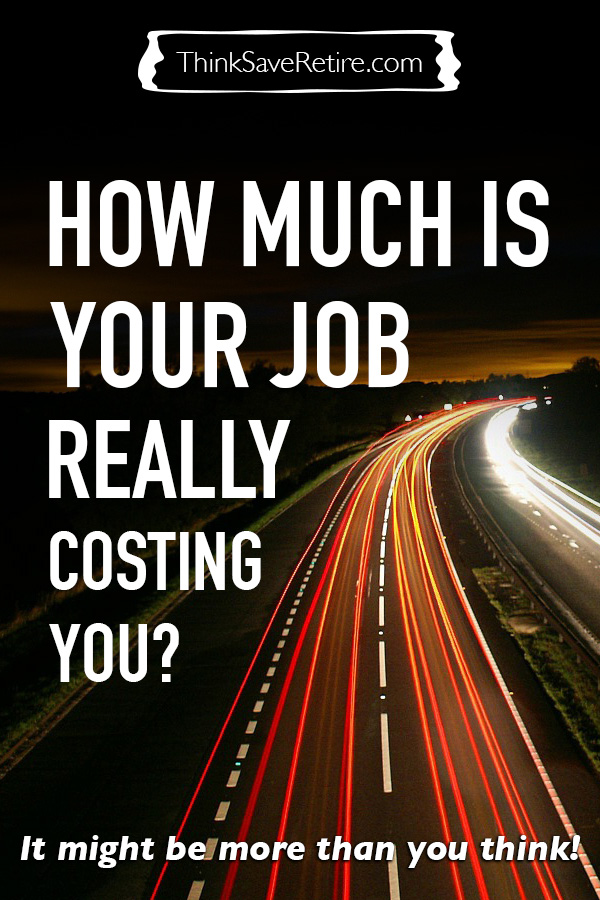How much is your job really costing you?
More times than not, our job is slowly and mercilessly killing our hourly wage by "forcing" us to spend more than we think in order to maintain that job.

Whenever we, as human beings in need of money to maintain our livelihoods, think of our jobs and what they provide for our lives, one of the more common elements is, of course, how much they pay us to do those jobs.
Unfortunately, far too few of us take the time to learn about the flip side of that equation - how much money WE are spending in order to do those jobs.

Effectively, we're slowly and mercilessly killing our hourly wage by spending more than we think in order to maintain our jobs.
If you've ever read Your Money or Your Life, you know this to be a calculation of your real hourly wage, and the math is pretty simple. If you work 40 hours a week and bring home $950, then divide 950 dollars into 40 hours to determine your hourly wage - in this example, $23.75 an hour.
But that's not the real story, is it? Of course not. If it were, then I wouldn't be writing this blog post. The truth is most people - me included - spend money in order to work. The money we spend decreases our effective hourly wage. Every dollar that we spend because of our jobs cuts into our profits from doing that job.
And the sources of these cuts are dreadfully incestuous, too. They come out of nowhere, and most of us have no idea that our jobs are causing us to spend a ton of money on crap that we wouldn't ordinary buy. Most of us don't think about WHY we are making some of the purchases that we are. More of them are job-related than we probably realize.
What if I told you that your real hourly wage can easily be cut in half by hidden (and not-so-hidden) job-related spending?
Your Job or Your Money
Let's dig in here a little bit and consider some of these sources of expenditures and what their weekly drains are to our job-related profits. Some are obvious, like gas and car maintenance, but others are much more stealthy, like that vacation you took to "get away from it all". Let's face it - the responsibilities of your job are probably part of what you're trying to escape from.
The numbers that I am using below are purely hypothetical. Consider these as an example and substitute your own best guesses. The larger point, as you will soon see, is that our jobs cost us a lot of money, and our hourly wages take a gigantic hit because of it.
Cars and transportation - this is probably the most obvious source of drain to our hourly wage. We may all have cars even if we didn't hold jobs, but what about your daily commute? The oil and tire changes due to the miles that you're putting onto your car? The pothole you hit on the way home from work, requiring a new fender or wheel? Toll roads. Parking fees. If you don't drive, bus or train fees. Even within Cars and Transportation, the most obvious money drain category of job-related spending, hidden expenditures are everywhere and the costs go up, fast. When I commuted for a living, this easily set me back around $90 a week, all-in with car maintenance included.
Food - some of us like to be social and grab a bite to eat during lunch with a few co-workers. Clearly, this adds into our food-related expenses for our job. Don't forget that morning coffee you buy on the way into work, or the bag of chips or cookies that you pick up on your way home after a long and stressful day because, well, you need to relax and unwind. Let's average around $30 a week for food, assuming we bring our lunch at least some of the time.
Unwind and decompress - if you're a human, you probably want time to relax away from your job. For some of us, that might mean food. Or an adult beverage. Or buying a new book or movie. However you satisfy your need to unwind, these costs too cut into your real hourly wage. The more stressful the job, the more potential it has to destroy your profits from work. If this is a tough one to quantify, think about what you do when you get home from work. How many of those things are directly, or indirectly, costing you money? Let's assume $25 a week is spent on items to help you decompress from the job and relax at home.
Wardrobe - most organizations require something other than a t-shirt and shorts. Button-down shirts, blouses, jeans or khakis, dress shoes. And don't forget that all these clothes need to be washed, which requires the use of soaps and other detergents. Also, hair cuts or hair styles can also be a part of these expenditures, too. Let's say this amounts to $20 a week averaged over a year of buying new clothes and keeping yourself generally hygienic enough to work daily at your job without grossing out your co-workers.
Our "away" time - even if we enjoy our jobs, they always, at least to some degree, account for our need to get away. This could mean a vacation to somewhere, or a membership to a country club, exercise equipment or your weekend jet ski. You may find that you'd do or have these things anyway, even without a job. But those numbers are exceedingly tough to quantify. The truth is if we didn't have a job, there would be much less to get "away" from. Averaged over the year, let's assume $15 in this category.
Stress and ickiness - the more stressful our jobs, the greater the likelihood that we will work ourselves until we are literally sick. Expenses in this category include medicine or prescriptions for your job-induced headaches, weekly massages or any expense related to a medical or health issue from work. Averaged, let's assume around $20.
The Catch-all - here, any other job-related expense gets tracked, like daycare for your kids, a therapist (that was hired due to job-related issues), any shopping that you might do while at work because you are bored or otherwise actively disengaged. Let's use $30 on average (this could add up to MUCH MORE if you're paying for daycare for your child or pets).
The "Holy Crap" moment
If we add up our expenses from all the categories above, we get a total of $230. Remember, that is a weekly figure - in the hypothetical scenario above, we are blowing through $230 every week due to our job. Now, let's see what effect this has over our hourly wage.
Before these costly hits, our hourly wage was $23.75, which was the result of dividing 40 hours worked by the number of dollars that we make in a week, $950.
To determine our real hourly wage, subtract the total weekly job-related expenses from our wage and try the math again. Now, instead of using $950, we will use $720, which is the difference between 950 and 230.
What is our real hour wage: 720/40 = $18. We've gone from making $23.75 an hour down to an effective $18 due to the expenses incurred simply to work.
And honestly, I was fairly conservative with some of those expenses. Many would find their Food category significantly higher than $30. Go out for lunch five days a week for an average of $10 a meal and you're already at $50, and that doesn't include the morning coffee or snacks throughout the day from the vending machine, nor any of the treats that you allow yourself after stressful days or significant achievements.
These costs can easily add up to draining half of your hourly wage away, leaving you with something a bit more modest to be proud of. Most people can expect a least a third of their wages to be stripped away due to job-relates spending. If you work from home, maybe less. If your commute is long and tedious, there is a good chance that it's quite a bit more.
Have you tried calculating your real hourly wage? How much are your job-related expenses taking from your life?